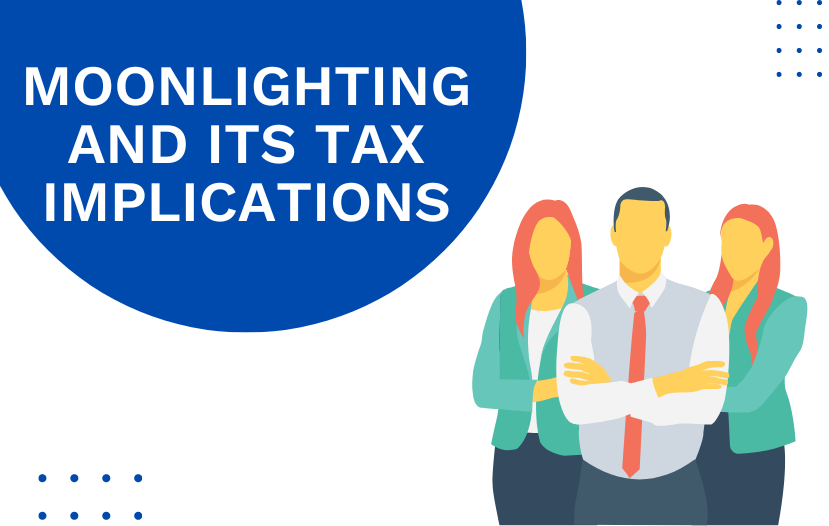Moonlighting and its Tax Implications


Following the Covid pandemic, which resulted in widespread layoffs and/or wage reductions, the number of persons who opted for moonlighting increased dramatically. Many salaried workers were forced to take on other jobs while working from home to make up the difference in their income.
Moonlighting has become more common among working professionals in India, which consequently created compliance concerns with businesses.
A meal delivery service called Swiggy unveiled a groundbreaking "moonlighting" policy in August, allowing their staff to work on several projects concurrently after work with specific restrictions. A few days later, Wipro's chairman Rishad Premji gave a conflicting opinion and referred to the idea of moonlighting as dishonest.
Moonlighting refers to taking up a second job while remaining employed by the primary employer.
The second job is typically taken without the employer's knowledge, at night or on the weekends, therefore the income from moonlighting might result in complicated tax situations that the taxpayer needs to be aware of.
For instance, both the employers will take into account the basic deduction of 50,000 and 80C deductions to determine the tax obligation if the side income is received as salary. Both employers will also take into account the basic exemption threshold and the tax bracket based on the employee’s individual earnings. This could result in each employer's TDS deduction being less than the taxpayer's overall tax liability.
Here are the tax implications of Moonlighting:
When income from moonlighting is received as business income or professional fees:
Profit and Gains from Business and Profession is a tax that applies to business or professional income (PGBP). Travel expenditures, laptop depreciation, and other costs incurred for the second employment can be deducted as business expenses from their income. The leftover amount is taxed at the appropriate slab rates. If the amount of tax due exceeds Rs. 10,000, the taxpayer must pay the advance tax in four equal payments of 15%, 45%, 75%, and 100%.
Alternatively, taxpayers can take advantage of a presumptive tax plan if their second employment is in one of the professions named in section 44ADA of the Income Tax Act and their income is less than Rs 50 lakh. According to this, professionals who moonlight only have to pay taxes on 50% of their professional fees. In this case, taxpayers cannot deduct expenses because they have obtained a flat 50% discount. On March 31, they must just pay the final advance tax instalment.
When the income from moonlighting is received as salary
Tax computations may become a bit difficult if a taxpayer receives their side income as a salary, and they may need to be more cautious when preparing their taxes.
Employers calculate an anticipated taxable income amount before applying TDS. Both employers take into account the standard deduction of Rs. 50,000 in this estimation, but the taxpayer may only do so once. They may also take into account the 80C deduction, which may exceed the overall amount of Rs 1.5 lakh. With this the tax outflow will increase substantially.
The taxpayers will therefore be required to make these changes when submitting their taxes and pay the majority of the increased taxes and interest. To avoid this, the taxpayers must compute the total taxes, subtract the tax deducted (TDS) by the employer and pay the balance as advance tax installments.
When the income from moonlighting when working on a part-time basis
Apart from these two, there is another class of employees engaged in self-employment on an independent part-time basis and going the extra mile without reporting to someone or joining the other entity. For instance, teachers and lecturers take private tuitions, experts providing digital marketing services, during weekends or post office. In such case, their incomes are chargeable to tax under the head “Income from Other sources”.

